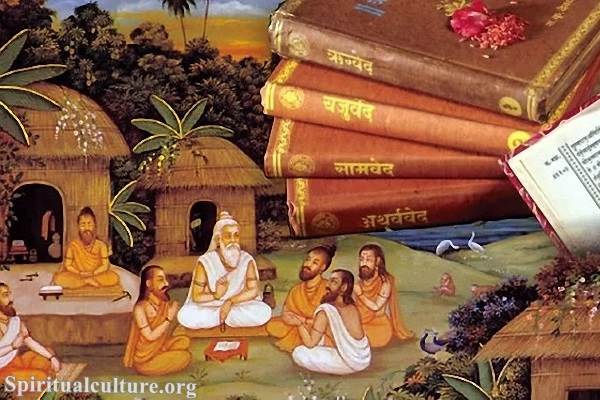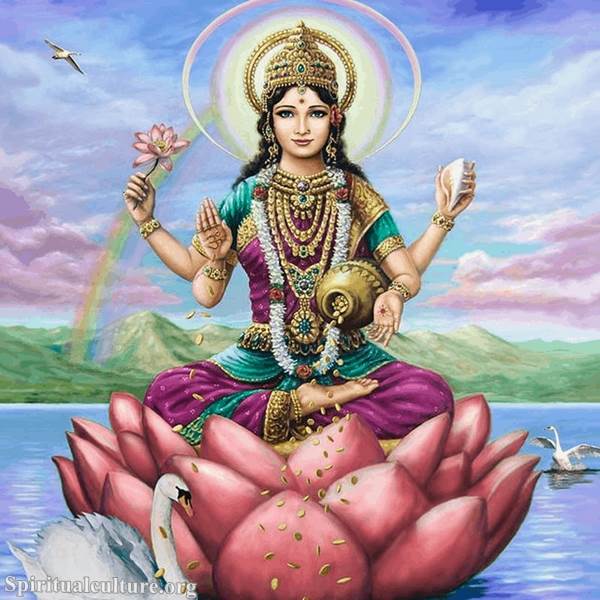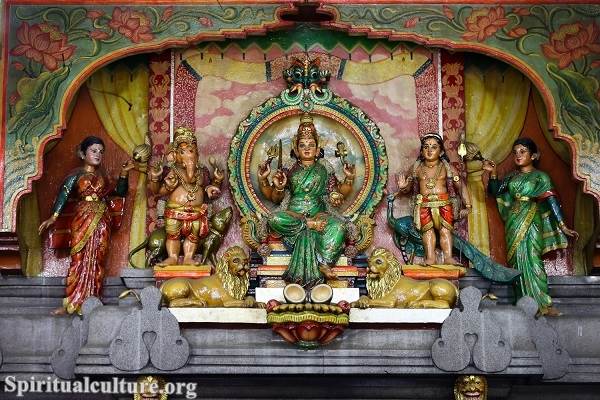I. The importance of the Vedas
The Vedas are considered to be the source of all Hindu philosophy and knowledge, including dharma (ethical and moral principles), yoga, meditation, and Hindu rituals and practices.
The Vedas are considered to be revelations by Hindu gods and sages and are revered as timeless and eternal sources of wisdom and truth.
The Vedas are believed to have been orally transmitted by sages and priests and are revered as timeless and eternal sources of knowledge and wisdom. They provide guidance on dharma (moral and ethical principles), karma (the law of cause and effect), and the path to liberation (moksha) from the cycle of reincarnation. They also contain teachings on yoga, meditation, and the worship of Hindu gods and goddesses.
The Vedas have played a significant role in shaping Hinduism and continue to be highly revered and studied by Hindus today. They are considered to be apauruṣeya, or not of human origin, and are believed to have been revealed by the gods to ancient sages.
The Vedas are also considered to be a vast store of knowledge and contain information on various subjects such as astronomy, medicine, and law. The Vedic period in India saw the development of the Sanskrit language, which was used to preserve the knowledge contained in the Vedas. The Vedas were initially passed down orally from generation to generation and were only later written down.
The study of the Vedas is considered to be of great importance in Hinduism and is known as Vedanta. The study of the Vedas is considered to lead to the realization of ultimate truth and to bring about spiritual liberation. The Vedas are also considered to be the source of all Hindu philosophical systems, such as Samkhya, Yoga, and Vedanta, which form the basis of Hindu thought.

In addition to their religious and philosophical significance, the Vedas also have great historical value, as they provide valuable insights into the social, economic, and political systems of ancient India. They are also a rich source of information on the development of Hindu rituals and practices, as well as the evolution of Hindu thought and beliefs over time.
Overall, the Vedas are an integral part of Hinduism and have had a profound impact on the religious, philosophical, and cultural heritage of India. They continue to be highly revered and studied by Hindus today, and are considered to be a timeless source of wisdom and truth.
II. Main Vedas
The Vedas are a collection of sacred texts that form the foundation of Hinduism and are considered to be the oldest religious texts in India. There are four main Vedas: the Rigveda, Samaveda, Yajurveda, and Atharvaveda.
1. Rigveda
The Rigveda is the oldest of the four main collections of sacred texts in Hinduism, known as the Vedas. It consists of hymns and prayers addressed to various Hindu deities, including Agni (fire), Indra (warrior god), and Soma (a plant-based sacrament). The Rigveda is considered the most important of the Vedas, and many of its hymns are still recited in Hindu rituals today.
The Rigveda contains over 1,000 hymns and is organized into 10 books. The hymns are written in Sanskrit and are addressed to various Hindu gods and goddesses, praising their attributes, powers, and actions. The hymns also contain prayers for protection, success, and prosperity, and express the beliefs and values of ancient Hindu society.
The Rigveda is considered to be a storehouse of knowledge on Hindu philosophy, including teachings on dharma (moral and ethical principles), karma (the law of cause and effect), and the path to liberation (moksha) from the cycle of reincarnation. It also contains information on Hindu rituals and practices, including fire ceremonies and offerings to the gods.
The Rigveda is considered to be of great importance in Hinduism and is studied by students of Hinduism and priests who perform Hindu rituals. It is revered as a timeless source of knowledge and wisdom and continues to play a significant role in the religious, philosophical, and cultural heritage of India. The Rigveda is also considered to be one of the earliest examples of Sanskrit literature and is highly regarded for its literary beauty and poetic expression.
2. Samaveda
The Samaveda is one of the four main collections of sacred texts in Hinduism, known as the Vedas. It is a collection of hymns and songs and is considered to be the Veda of melodies or songs. The Samaveda consists of hymns from the Rigveda, but these hymns have been rearranged and adapted for use in musical performances and chanting.
The Samaveda contains hymns and songs addressed to various Hindu deities, including Agni (fire), Indra (warrior god), and Soma (a plant-based sacrament). The hymns and songs are written in Sanskrit and are intended to be sung or chanted as part of Hindu rituals.
The Samaveda is considered to be a storehouse of knowledge on Hindu music, and its songs and melodies continue to be used in Hindu rituals and ceremonies today. It is also considered to be a source of knowledge on Hindu philosophy, including teachings on dharma (moral and ethical principles), karma (the law of cause and effect), and the path to liberation (moksha) from the cycle of reincarnation.
The Samaveda is considered to be of great importance in Hinduism and is studied by students of Hinduism and priests who perform Hindu rituals. It is revered as a timeless source of knowledge and wisdom and continues to play a significant role in the religious, philosophical, and cultural heritage of India. The Samaveda is also considered to be a valuable resource for the study of Hindu music and its development over time.
3. Yajurveda
The Yajurveda is one of the four main collections of sacred texts in Hinduism, known as the Vedas. It contains prose explanations and instructions for performing Hindu rituals, and its name literally means “the Veda of sacrificial formulas.” The Yajurveda is divided into two main parts: the Shukla Yajurveda, which is associated with the white (shukla) recension, and the Krishna Yajurveda, which is associated with the black (krishna) recension.
The Yajurveda contains a wealth of information on Hindu rituals and practices, including offerings to the gods, fire ceremonies, and various other rituals performed by priests. It also provides detailed instructions on how to perform these rituals, including the use of mantras, prayers, and offerings.
The Yajurveda is considered to be the source of much of Hindu temple worship, as it contains hymns and prayers that are still recited in Hindu temples today. It is also considered to be a storehouse of knowledge on Hindu philosophy, including teachings on dharma (moral and ethical principles), karma (the law of cause and effect), and the path to liberation (moksha) from the cycle of reincarnation.
The Yajurveda is considered to be of great importance in Hinduism and is studied by students of Hinduism and priests who perform Hindu rituals. It continues to play a significant role in the religious, philosophical, and cultural heritage of India and is revered as a timeless source of knowledge and wisdom.
4. Atharvaveda
The Atharvaveda is one of the four main collections of sacred texts in Hinduism, known as the Vedas. Unlike the other Vedas, which primarily contain hymns and prayers addressed to Hindu deities, the Atharvaveda contains a diverse collection of hymns, spells, incantations, and magical formulas. It is considered to be the Veda of magic and spells.
The Atharvaveda contains hymns and prayers for a wide range of purposes, including health and healing, protection from evil, success in business, and protection from natural disasters. It also contains hymns and prayers addressing various aspects of daily life, such as marriage, childbirth, and death.
The Atharvaveda is considered to be a source of knowledge on Hindu philosophy, including teachings on dharma (moral and ethical principles), karma (the law of cause and effect), and the path to liberation (moksha) from the cycle of reincarnation. It also contains information on Hindu rituals and practices, including fire ceremonies and offerings to the gods.
The Atharvaveda is considered to be of great importance in Hinduism and is studied by students of Hinduism and priests who perform Hindu rituals. It is revered as a timeless source of knowledge and wisdom and continues to play a significant role in the religious, philosophical, and cultural heritage of India. The Atharvaveda is also considered to be an important resource for the study of ancient Hindu beliefs and practices.



